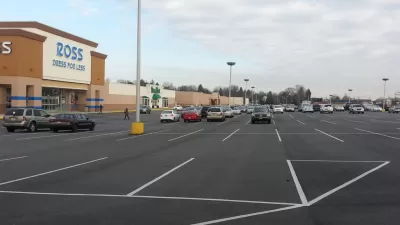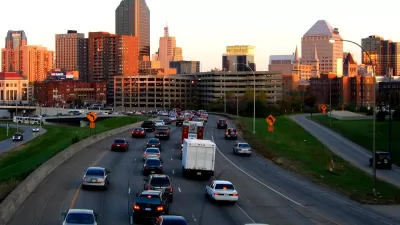Minimum parking requirements, argues Michael Manville, raise the cost of construction and eat up valuable urban real estate.

In a piece for The Atlantic, Michael Manville, associate Urban Planning professor at UCLA's Luskin School of Public Affairs, argues that minimum parking requirements "have been a disaster" for cities. Manville quotes Lewis Mumford, who in the 1960s decried the urban focus on parking as "the right to destroy the city." According to Manville, parking requirements have caused "needless damage," over decades, "with few people even noticing."
Cars, Manville writes, consume space—even when the car is not in motion or even present. "Cities designed for cars must set aside space: space to wait for cars, and space to hold them while they wait for their drivers to come back." Parking minimums take the cost of parking "and push it onto developers, hiding it in the cost of building." In Los Angeles, one parking spot can add as much as $50,000 to the cost of a building.
"Because parking requirements make driving less expensive and development more so, cities get more driving, less housing, and less of everything that makes urbanity worthwhile." Fulfilling local leaders' visions of "walkable downtowns and affordable units" requires eliminating the long-standing parking requirements that undermine them. "America’s disastrous experiment with parking requirements," writes Manville, "should end."
FULL STORY: How Parking Destroys Cities

Alabama: Trump Terminates Settlements for Black Communities Harmed By Raw Sewage
Trump deemed the landmark civil rights agreement “illegal DEI and environmental justice policy.”

Study: Maui’s Plan to Convert Vacation Rentals to Long-Term Housing Could Cause Nearly $1 Billion Economic Loss
The plan would reduce visitor accommodation by 25% resulting in 1,900 jobs lost.

Planetizen Federal Action Tracker
A weekly monitor of how Trump’s orders and actions are impacting planners and planning in America.

Study Links Covid and Poor Driving
The effects of the virus, including ‘brain fog,’ can make driving more difficult and dangerous.

Waymo Gets Permission to Map SF’s Market Street
If allowed to operate on the traffic-restricted street, Waymo’s autonomous taxis would have a leg up over ride-hailing competitors — and counter the city’s efforts to grow bike and pedestrian on the thoroughfare.

Parklet Symposium Highlights the Success of Shared Spaces
Parklets got a boost during the Covid-19 pandemic, when the concept was translated to outdoor dining programs that offered restaurants a lifeline during the shutdown.
Urban Design for Planners 1: Software Tools
This six-course series explores essential urban design concepts using open source software and equips planners with the tools they need to participate fully in the urban design process.
Planning for Universal Design
Learn the tools for implementing Universal Design in planning regulations.
Caltrans
Smith Gee Studio
Institute for Housing and Urban Development Studies (IHS)
City of Grandview
Harvard GSD Executive Education
Toledo-Lucas County Plan Commissions
Salt Lake City
NYU Wagner Graduate School of Public Service





























